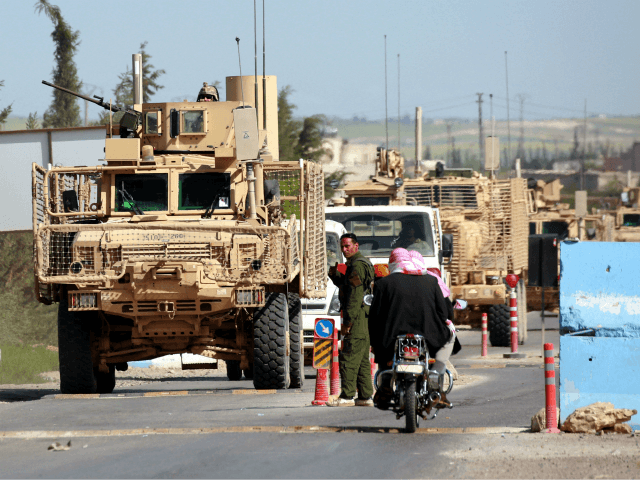A Pentagon spokesman told reporters on Thursday that revenues from Syrian oil secured by U.S. troops will go to the majority Kurdish Syrian Democratic Forces (SDF), not to the United States.
The SDF is a U.S.-allied coalition that has played a fundamental role in the eradication of the Islamic State from Syria, particularly from the jihadist caliphate’s “capital,” Raqqa. President Donald Trump announced last month that he would withdraw American troops from the SDF’s territory, Syrian Kurdistan (Rojava), as the Islamic State no longer posed a threat to the region.
American troops are only legally allowed in Syria to combat al-Qaeda and its offshoots and allies. The Islamic State, formerly al-Qaeda in Iraq, split from the group in 2013.
Following the withdrawal from Rojava, President Trump announced that some American troops would remain elsewhere in Syria to “secure the oil.” The Islamic State funded many of its terrorist activities using black market oil sales from territories captured during its peak in 2014-2017.
“The revenue from this is not going to the U.S. This is going to the SDF,” Pentagon spokesman Jonathan Hoffman confirmed, dispelling criticisms from Syrian dictator Bashar al-Assad and others that America is colonizing and exploiting Syrian resources. “So it’s preventing ISIS (from getting) it, allowing the Kurds and the SDF in there to have control of it as well.”
Following the departure of U.S. troops from Rojava, President Trump insisted that the U.S. would “keep the oil.”
“We’ve secured the oil, and, therefore, a small number of U.S. troops will remain in the area where they have the oil. … We’re keeping the oil — remember that,” he said on October 25. “I’ve always said that: ‘Keep the oil.’ We want to keep the oil. Forty-five million dollars a month? Keep the oil.”
Pentagon officials insisted on Thursday that President Trump specifically meant that the U.S. would “keep the oil” from ISIS.
“The mission is the defeat of ISIS,” Adm. William Byrne, the antiterrorism chief for the Joint Staff, told reporters. “The securing of the oil fields is a subordinate task to do that mission. And the purpose of that task is to deny ISIS the revenues from that oil infrastructure.”
Security officials believe that, at its peak in 2015, the Islamic State was making $50 million a month from black market oil sales. Assad and Turkish President Recep Tayyip Erdogan reportedly participated in the purchases, according to captured ISIS fighters. By 2017, that revenue was down 90 percent due to efforts by the United States, Kurdish allies, and others.
The oil fields in question reportedly produce $45 million worth of oil per month. Syria as a whole is believed to produce 80,000 barrels of crude oil a day, though the ongoing status of the civil war makes an exact number difficult to estimate.
In contrast, the United States produced over 12 million barrels of oil a day in August. America is believed to host the world’s largest oil reserves, estimated at 293 billion barrels, or 291 billion barrels of oil more than Syria was believed to possess in the last year before the civil war, 2011.
“The main reason behind [the US presence in Syria] is definitely not oil,” Mazloum Abdi, the commander of the SDF, said in an interview with the Kurdish outlet Rudaw this week. “Everyone knows the U.S. does not need the oil. They say that this oil should not fall into the hands of Daesh [Islamic State], the Syrian regime or other forces.”
Abdi speculated that the reason for Trump to have walked back his announcement of a withdrawal from Syria is the immense pressure from opposition groups in the United States.
“There was later great pressure on the Trump administration, such as opposition from Congress and the Senate. All our American friends, soldiers and politicians, oppose the Trump administration’s [decision]. President Trump’s fame was at risk,” Abdi said.
Assad offered a differing opinion in an interview published by his state media last week, calling Trump “the best American president” because he is “the most transparent” about plundering Syrian oil.
“Trump talks transparently, saying that what we want is oil. This is the reality of American policy, at least since WWII,” Assad said. “We want to get rid of such and such a person or we want to offer a service in return for money. This is the reality of American policy. What more do we need than a transparent opponent? That is why the difference is in form only, while the reality is the same.”
American presidents “are a group of criminals who represent the interests of American lobbies, i.e. the large oil and arms companies, and others,” Assad said.
The SDF has for years avoided any concrete alliance with Assad. In the Rudaw interview, Abdi insists that peace with Damascus requires an autonomous Kurdish region within Syria, like the Kurdistan Regional Government (KRG) of Iraq, to prevent another wave of ethnic cleansing or genocide against the Kurdish people. The SDF has also avoided conflict with Assad’s forces, however, and brokered a deal with his Syrian Arab Army following the departure of U.S. troops from Rojava.

COMMENTS
Please let us know if you're having issues with commenting.